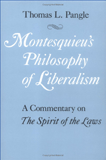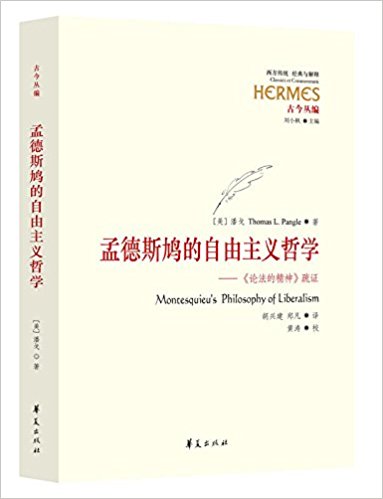• Home | • Curriculum Vitae: » PDF | • Return to Books & DVD

Book Highlights:

Montesquieu's Philosophy of Liberalism:
A Commentary on the Spirit of the Laws
A Commentary on the Spirit of the Laws
University of Chicago Press, 1973; paperback ed. 1989
In this work--the first comprehensive commentary on The Spirit of the Laws--Thomas L. Pangle attempts to uncover and explicate the plan and the reasons for the obscurity of Montesquieu's famous but baffling treatise....
The author reveals The Spirit of the Laws as a systematic attempt to place on a firmer foundation the liberal political philosophy that had emerged earlier in the writings of Hobbes, Spinoza and Locke....
Perhaps the most fascinating, and certainly the most original, theme of The Spirit of the Laws is the argument that political philosophy must combine natural standards with standards discovered in the process of history.... As a consequence, Professor Pangle argues, it is only in studying The Spirit of the Laws that we become fully conscious of the grounds for the widely accepted but profoundly questionable substitution of History for Nature as the source of normative principles in political life.
The author reveals The Spirit of the Laws as a systematic attempt to place on a firmer foundation the liberal political philosophy that had emerged earlier in the writings of Hobbes, Spinoza and Locke....
Perhaps the most fascinating, and certainly the most original, theme of The Spirit of the Laws is the argument that political philosophy must combine natural standards with standards discovered in the process of history.... As a consequence, Professor Pangle argues, it is only in studying The Spirit of the Laws that we become fully conscious of the grounds for the widely accepted but profoundly questionable substitution of History for Nature as the source of normative principles in political life.
An interesting and timely study as judicious as it is authoritative, and one that fully deserves the attention of both Montesquieu specialists and of every amateur who has first done Montesquieu the honor of attempting to wade through L'ESPRIT DES LOIS itself.
-Humanities Association Review
Pangle is always informative and intelligent, frequently brilliant and profound. He is the first scholar in recent times to have risen to Montesquieu's own level in comprehending 'the work of twenty years' and seeking the 'design' and 'principles' of which the preface speaks. There is no looking down on his subject from the supposedly superior vantage point of the present, and because of this our incentive for pursuing the serious study of Montesquieu, liberalism and political philosophy as such has been strengthened.
-Political Theory
L'ouvrage a le mérite de maintenir l'attention toujours éveillée et d'inviter à une lecture minutieuse des chapitres les moins connus de L'ESPRIT DES LOIS qui, traitant de la religion, du commerce ou de l'histoire, sont loin d'être les moins intéressants. Reconnaissons donc en ce livre précis et bien documenté un commentaire éclairant de cette "philosophie" de Montesquieu qui, incontestablement, a marqué de sa griffe le libéralisme des Temps Moderns.
-Revue De Metaphysique et De Morale
A stimulating and persuasive book. Not to be disregarded or neglected by the Montesquieu scholar or the political scientist.
-Eighteenth-Century Studies
Pangle sheds a great deal of light on a problem that has always troubled Montesquieu scholars, the question as to why Montesquieu chose to write THE SPIRIT OF THE LAWS in the particular form that he did. Most scholars have assumed that the work, at bottom, has no particular order or consistency, but rather has the character of an almost random series of aphorisms. This was thought to reflect the inconsistency and incoherence of Montesquieu's thought. Pangle, however, has discovered an order to the work which is imitative of its most profound theme. Pangle's commentary, which is an elaborate demonstration of this thesis, should set the standard for Montesquieu scholarship.
-The Modern Schoolman
It is the sort of book one reads arguing every step of the way, but emerging with a much clearer understanding of what the questions in Montesquieu are and how one ought to understand them.
-American Political Science Review
The study is a model of its kind and should be recognized as the landmark it surely is, not only for Montesquieu and the Enlightenment but for subsequent political philosophy, not excluding the current debates about "liberalism," "participatory democracy," "electoral politics," and the whole contemporary critique of Western ideals and institutions.
-Reviews in European History
Book Highlights:
- A critical monograph on this book has appeared as: Bernard Manin, "Montesquieu et la Politique Moderne," Cahiers de Philosophie Politique (Publication du centre de Philosophie Politique de l'Universite de Rheims), no. 2-3 (1985), pp. 157-229.
- Review Essays in English have appeared in Reviews in European History (1974) and The Political Science Reviewer (1976), in addition to numerous brief reviews.
- Excerpts from chapter eight have been reprinted in the entry "Montesquieu" in Literature Criticism from 1400 to 1800, ed. James Person, Jr. (Gale Publishing, 1988), vol. 7, pp. 350-52.
- A panel on the book's 25th anniversary was held at the Canadian Political Science Assn. convention, June 1997.

Chinese Translation

